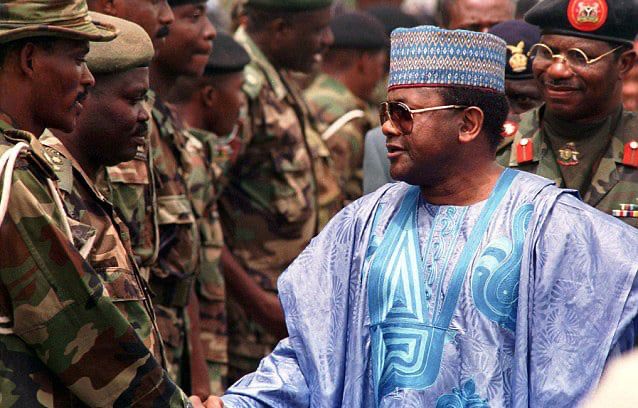By Musa Abdullahi Sufi
As Nigeria continues its democratic journey and the African continent repositions itself on the global stage, history often reopens pages that deserve deeper introspection. One such page bears the name of Late General Sani Abacha, the Nigeria’s military ruler from 1993 to 1998 who decades after his death, remains one of the most polarizing figures in African leadership history.
While his rule attracted criticism, a fair assessment reveals a legacy of economic stabilization, infrastructural development, regional diplomacy, and strategic sovereignty that reshaped Nigeria’s trajectory and inspired models of governance across Africa. A growing chorus of voices; academics, leaders, and development analysts are calling for a more nuanced understanding of his role.
Stabilizing a Nation in Crisis
At the time Abacha assumed power in 1993, Nigeria was politically fractured and economically hemorrhaging. Inflation had surged past 50%, the naira was rapidly depreciating, and the country teetered on the edge of disintegration after the annulment of the June 12 election. In a move that surprised many, Abacha implemented one of the most disciplined fiscal regimes in Nigeria’s modern history.
Under his leadership, Nigeria’s foreign reserves grew from $494 million in 1993 to $9.6 billion by 1998, and the external debt was reduced from $36 billion to $27 billion. He established the Petroleum Trust Fund (PTF), chaired by General Muhammadu Buhari, to transparently manage proceeds from the partial removal of fuel subsidies and directly fund projects in health, education, agriculture, and infrastructure.
“Say what you will, Abacha brought financial discipline,” said Professor Adebayo Olukoshi, a renowned African political economist. “He challenged the IMF dogma and showed that national priorities can drive fiscal growth.”
Infrastructure That Endures
One of the most visible testaments to Abacha’s rule is in Nigeria’s infrastructure landscape. Several of the country’s key highways, hospitals, water systems, and bridges were either built or significantly expanded during his time.
The Third Mainland Bridge expansion, dualization of Abuja highways, and multiple federal secretariats across Nigeria’s 36 states were all commissioned or completed under Abacha. In healthcare, he approved the modernization of University Teaching Hospitals in Lagos, Ibadan, and Zaria, and strengthened primary healthcare delivery through targeted PTF projects.
“Abacha’s infrastructure plan was Nigeria’s closest equivalent to America’s New Deal,” observed Dr. Carl LeVan, professor of comparative politics at American University, Washington D.C. “It wasn’t just about roads—it was about national integration.”
Championing African Sovereignty
On the continental front, General Abacha played an active role in stabilizing West Africa. His intervention in Liberia and Sierra Leone, under the auspices of ECOMOG, curbed brutal civil wars and protected democratic transitions. Nigeria under Abacha contributed the largest troops and resources to West African peacekeeping efforts, often footing the bills alone when other regional powers hesitated.
Former Ghanaian President Jerry Rawlings once remarked:
“It was Nigeria under Abacha that gave ECOWAS its backbone. Without that courage, West Africa would have descended into chaos.”
Moreover, Abacha resisted intense external pressures from Western governments and financial institutions, insisting on self-determination, local content, and pan-African solidarity. He aligned closely with Muammar Gaddafi, Robert Mugabe, and Thomas Sankara’s ideological legacy, framing African ownership of its resources as non-negotiable.
A Complex Legacy with Lasting Impact
General Abacha’s governance was characterized by centralization, but he also established frameworks that outlived him. The creation of six geopolitical zones that include North Central, North East, North West, South East, South South, and South West was conceived during his administration, providing a structure that continues to shape national policy, political equity, and federal appointments.
More recently, in 2020, President Muhammadu Buhari praised Abacha for his “visionary allocation of the oil windfall” and described him as “a leader whose fiscal patriotism kept Nigeria afloat in difficult times.”
“General Sani Abacha’s efforts were misunderstood. He worked day and night for Nigeria’s stability. Many of the projects we see today (like) roads, hospitals, and schools were results of his vision. He didn’t seek praise; he sought results.” — Major Hamza Al-Mustapha, former CSO to General Abacha.
Lessons for Emerging Leaders
In an era when many African leaders are accused of pandering to foreign interests and neglecting national development, Abacha’s firm stance on sovereignty, economy, and security provides an alternative model. His vision of a strong, independent Nigeria unafraid of asserting its voice on the world stage resonates deeply with today’s rising generation of Pan-Africanists.
“He gave us roads. He gave us a stable naira. He gave Africa a sense of pride,” said Ambassador Babagana Kingibe, a former foreign minister and Secretary to the Government of the Federation. “History will look back more kindly on General Abacha.”
Conclusion
While his administration was not without blemish, the growing global reassessment of Late Sani Abacha’s legacy speaks to the importance of looking beyond political rhetoric to the substance of governance. His contributions to economic resilience, infrastructural transformation, and African assertiveness are tangible and enduring.
For Nigeria and Africa, General Sani Abacha remains a symbol of national focus, continental pride, and sovereign resistance a man whose legacy, though complex, deserves more than a footnote in history.
May his Soul Rest In Peace! Amin.
About the Author:
Musa Abdullahi Sufi is a Nigerian development expert, researcher, and journalist with a passion for African leadership, governance, and human development. He writes for local and international publications and leads strategic initiatives focused on innovation, equity, and education across West Africa.

